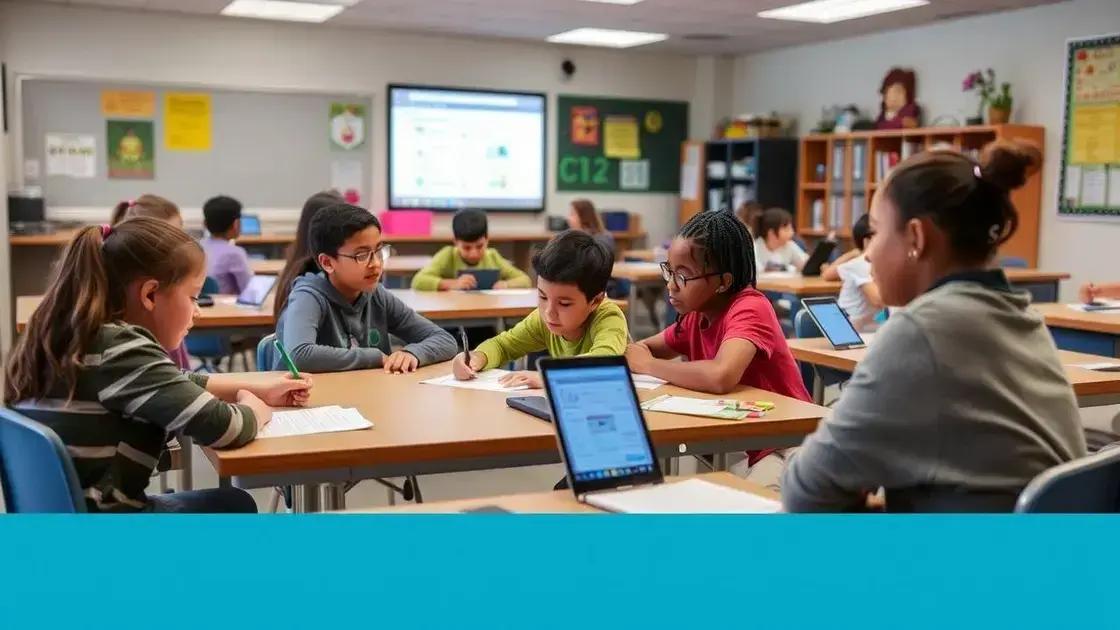International education news: What you need to know

Anúncios
International education provides students with diverse learning experiences, cultural immersion, and opportunities for personal and academic growth, preparing them for a globalized job market.
International education news is constantly evolving, opening doors to new opportunities for students worldwide. Ever wondered how these changes affect your options for studying abroad? Let’s dive into the latest updates.
Anúncios
Key trends in international education
In recent years, the landscape of international education has changed significantly. Understanding these key trends is essential for students considering their study options abroad. With new technologies and global shifts, students are finding exciting opportunities around the world.
Growth of Online Learning
One noticeable trend is the rise of online learning programs. Many universities now offer remote courses that allow students to study from anywhere.
- Increased accessibility for a wider audience.
- Flexible schedules that cater to different time zones.
- Partnerships between institutions for shared resources.
This shift makes it easier for students to engage with international education despite geographical barriers.
Anúncios
Focus on Cultural Competence
Cultural competence is becoming a vital part of education. Programs now emphasize the importance of understanding and appreciating different cultures.
- Incorporating exchange programs into curricula.
- Interactive workshops on global awareness.
- Collaboration between international and local students.
These initiatives help prepare students for a globalized workforce, enhancing their experiences and perspectives.
Another interesting trend is the increasing participation of non-traditional students in international education. More adult learners, professionals, and diverse groups are pursuing studies abroad. This diversity enriches classroom discussions and broadens the overall learning environment.
Lastly, sustainability in education is making headway. Institutions are becoming more aware of their environmental impact. Many are now focusing on sustainability to create a positive future.
Adoption of Sustainable Practices
They are implementing green initiatives that promote eco-friendliness within campuses.
- Reducing waste and improving recycling programs.
- Emphasizing sustainability in academic programs.
- Creating partnerships with organizations that support environmental health.
These trends represent a shift toward a more inclusive and responsible approach to international education. By staying informed about these developments, students can make empowered decisions about their academic futures.
Benefits of studying abroad
Studying abroad offers many benefits that can enhance personal growth and education. Many students discover that this experience broadens their horizons in ways they never imagined. With opportunities to learn in different environments, students can gain a fresh perspective on their studies and life.
Academic Enhancement
One of the major advantages of studying abroad is the academic experience. Students often find that international programs provide unique courses and specialized training not available in their home countries.
- Access to world-renowned professors.
- Hands-on learning opportunities in local communities.
- Exposure to diverse educational systems.
This exposure can expand their academic knowledge and prepare them for future careers.
Personal Growth
Living in a new culture fosters significant personal growth. Students develop valuable life skills and become more independent.
- Strengthened problem-solving abilities.
- Improved communication skills.
- Increased adaptability in unfamiliar situations.
These skills are beneficial not only during their studies but also in the workforce later on.
Additionally, students have the chance to meet people from all over the world. Forming international friendships can create a network that lasts a lifetime.
The experience of navigating a foreign culture teaches students to appreciate diversity. They learn to respect different backgrounds and perspectives, which is essential in today’s globalized world.
Studying abroad also enhances job prospects. Employers often look for candidates who have international experience. This background can set students apart from others.
Career Opportunities
Many employers value the qualities that come from studying abroad.
- Proficiency in foreign languages.
- Global awareness and cultural sensitivity.
- Ability to work in diverse teams.
The experience makes graduates more attractive candidates in a competitive job market.
Real student experiences in global education

Hearing from students about their experiences is one of the best ways to understand the impact of global education. Many students who study abroad share stories that inspire and motivate others to take the leap. These firsthand accounts highlight the transformative power of being immersed in a different culture.
Personal Growth Stories
Students often describe how studying in another country has helped them grow personally. For instance, many find that they become more independent by managing their own finances and schedules.
- Learning to navigate public transportation.
- Cooking for themselves and trying local foods.
- Building self-confidence through new experiences.
These small challenges lead to significant growth, making them feel more prepared for the future.
Academic Insights
Academically, students report that their learning becomes more engaging outside of a typical classroom setting. For example, many enjoy taking part in hands-on projects that allow them to apply what they learn in real-world situations.
- Participating in field studies related to their major.
- Engaging with local experts in various fields.
- Collaborating on projects with international peers.
This type of immersive education fosters deeper understanding and retention of knowledge.
Moreover, students form lasting friendships with classmates from different backgrounds. These connections not only enrich their social lives but also promote cultural exchange.
They often describe sharing meals, celebrating local festivals, and engaging in cultural traditions as unforgettable experiences. Such interactions help students appreciate diversity while creating a global network that benefits them in their future careers.
Real stories also reveal the challenges students face. Adapting to new environments and languages can be tough, yet it often leads to resilience and a sense of accomplishment.
Overcoming Challenges
Students typically learn how to navigate difficulties like homesickness or language barriers.
- Finding support groups or communities.
- Practicing the local language with local people.
- Utilizing resources at their host institutions.
These experiences teach them valuable lessons in perseverance and adaptability.
Challenges faced by international students
International students often encounter a variety of challenges when studying abroad. These challenges can impact their academic performance and overall experience. Understanding these obstacles is crucial for both students and educational institutions.
Language Barriers
One of the most common challenges is facing language barriers. Many international students struggle to communicate effectively in a new language. This can lead to difficulties in understanding lectures, participating in discussions, and making friends.
- Misunderstanding instructions or assignments.
- Feeling isolated from peers.
- Struggling to express ideas clearly.
Language proficiency can significantly affect both academic success and social integration.
Cultural Adjustment
Another significant challenge is adjusting to a new culture. Different customs, social norms, and lifestyles can leave students feeling out of place. Navigating these cultural differences requires patience and understanding.
- Experiencing homesickness and loneliness.
- Overcoming stereotypes or misconceptions.
- Adapting to different classroom behaviors.
Students may feel overwhelmed as they try to adapt to an unfamiliar environment.
Additionally, international students might face unique financial challenges. The cost of tuition and living expenses can be daunting. Many students may find it hard to budget effectively in a foreign country.
Finding part-time work opportunities can also be difficult due to visa restrictions or local laws.
Academic Pressure
Academic pressure is another issue. International students often face high expectations from themselves and their families. The new educational system may differ significantly from what they are used to.
- Increased workload compared to their home country.
- Pressure to maintain scholarships or funding.
- Adapting to different grading systems.
These factors can lead to stress and anxiety, impacting their overall well-being.
Support systems play a vital role in helping students navigate these challenges. Many universities offer resources like counseling services, language support, and cultural integration programs. Students are encouraged to take advantage of these opportunities to ease their transition.
Future of international education and its impact
The future of international education looks promising and impactful, with many changes anticipated in the coming years. As globalization continues, the demand for international learning experiences is rising, making it essential to explore how these trends will evolve.
Technological Advancements
One major trend is the integration of technology in education. Online learning platforms and virtual exchange programs are expanding access to international education.
- Increased flexibility for students across the globe.
- Opportunities for remote internships and projects.
- Enhanced collaboration through digital platforms.
These technologies provide students with unique learning experiences, allowing them to connect beyond borders.
Focus on Global Competence
The emphasis on global competence is also shaping the future of international education. Educational institutions aim to prepare students for a connected world, where cross-cultural understanding is crucial.
- Incorporating global issues into local curricula.
- Promoting intercultural communication skills.
- Encouraging students to participate in international projects.
These initiatives empower students to navigate diverse environments effectively.
Moreover, international partnerships between universities are becoming more common. Collaborative programs allow institutions to share resources and offer joint degrees, enriching the academic experience for students.
As a result, students may have more opportunities to experience different cultures and educational systems while earning recognized qualifications.
Financial Accessibility
Financial accessibility is another critical factor influencing the future of international education. Scholarships and funding options are becoming increasingly available to support students from various backgrounds.
- Targeted scholarships for underrepresented groups.
- Grants for study-abroad programs.
- Increased financial literacy programs for students.
These initiatives aim to reduce financial barriers and increase participation in global education.
Finally, as global challenges such as climate change and social justice gain attention, education institutions are responding by embedding sustainability and ethical practices into their curricula. This shift will prepare students to address significant issues facing the world today.
FAQ – Frequently Asked Questions about International Education
What are the primary benefits of studying abroad?
Studying abroad offers enhanced learning experiences, cultural immersion, and improved job prospects due to global exposure.
How can technology improve my international education experience?
Technology allows for online learning, virtual exchanges, and access to global resources, making education more flexible and connected.
What challenges do international students commonly face?
Language barriers, cultural adjustment, financial pressures, and academic expectations are common challenges for international students.
What resources are available for international students?
Many universities offer support services such as counseling, language assistance, and cultural integration programs to help international students succeed.





